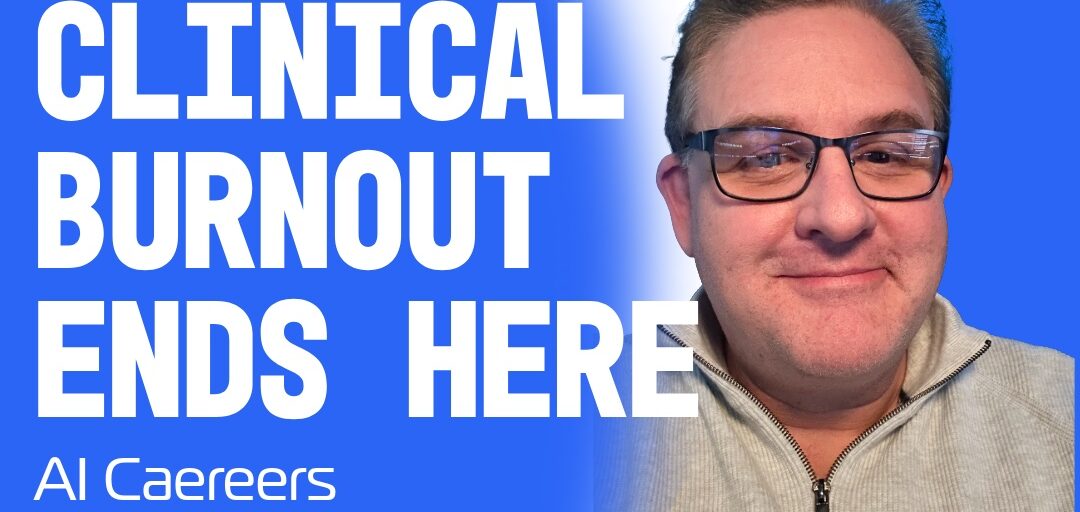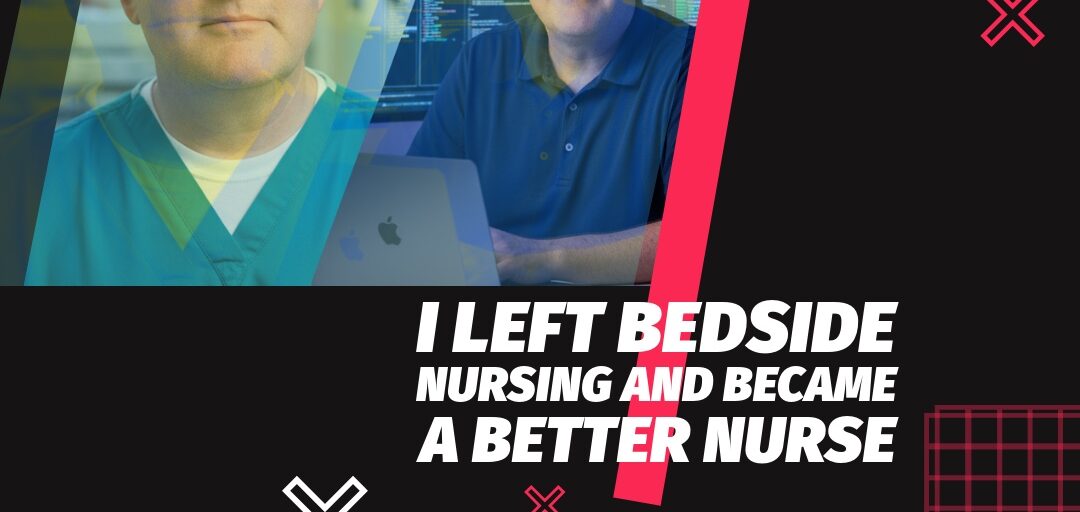The 9,000-Mile Commute: How Geographic Freedom Is Healthcare’s Future
Written by Rod on September 22, 2025
What if I told you that geographic freedom healthcare isn’t just a dream, but a proven reality that could transform your clinical career? For nine months, I demonstrated that working for a Dubai hospital from my UK home office wasn’t just possible—it was more impactful than traditional bedside care. My 9,000-mile commute proved that geographic freedom healthcare represents the future of how clinical expertise gets delivered worldwide, offering burned-out nurses and doctors a path to greater professional fulfillment, work-life balance, and global impact without sacrificing their valuable clinical knowledge.
This isn’t about working from home a few days a week. This is about completely redefining what it means to work in healthcare while maintaining the highest standards of patient care and professional fulfillment. My 9,000-mile commute changed everything I thought I knew about work-life balance in healthcare.
The Setup That Seemed Impossible
When the opportunity arose to work with a Dubai hospital system while living in the UK, most people told me it couldn’t work. “Healthcare requires physical presence,” they said. “You can’t manage clinical workflows from another continent.”
They were wrong on every count.
The Role: Clinical informatics consultant helping implement AI-powered patient monitoring systems across multiple hospital departments. My job was to ensure that technology served real clinical needs rather than just impressive technical specifications.
The Reality: Every morning, I would sit at my UK desk at 9 AM (1 PM Dubai time) and spend the next 6-8 hours deeply embedded in Dubai hospital operations. I attended clinical meetings via video, reviewed patient workflow processes, guided staff training sessions, and solved implementation challenges in real-time.
The Impact: During those nine months, we successfully deployed AI monitoring systems that improved early warning detection for critical patients by 40%. The geographic distance didn’t diminish the clinical impact—it amplified it.
Why Geographic Freedom Works in Digital Health
Traditional healthcare is constrained by physical presence, but digital health operates on different principles. When your expertise involves optimizing healthcare systems, analyzing data patterns, and implementing technology solutions, your location becomes irrelevant.
The Clinical Expertise Transfer: My years of bedside nursing experience didn’t become less valuable because I was 9,000 miles away. In fact, that clinical knowledge became more impactful because I could apply it to systems that served thousands of patients rather than the 6-8 patients I could care for during a bedside shift.
Real-Time Collaboration: Modern communication technology meant I was more accessible to the Dubai team than many consultants who worked in the same building. Video conferences, shared screens, and collaborative platforms created seamless integration with clinical teams.
Cultural Bridge Building: Working across time zones and cultures actually enhanced my ability to design systems that work for diverse patient populations and healthcare teams. The geographic challenge became a professional strength.
The Work-Life Integration Revolution
Here’s what nine months of geographic freedom taught me about work-life balance in healthcare:
Energy Conservation: Without the physical and emotional drain of hospital environments, I had significantly more energy for both work and personal relationships. I could engage deeply with complex clinical problems while still being present for family dinners.
Relationship Enhancement: My partner noticed that I was “actually home” rather than just physically present but mentally preoccupied with clinical stress. Geographic freedom eliminated the transition time between work stress and personal life.
Professional Growth: Working with international teams expanded my understanding of healthcare challenges and solutions. I learned more about global health systems in nine months than I had in years of domestic practice.
Schedule Autonomy: I could structure my workday around peak productivity hours and personal commitments. If I needed to attend a family event, I simply adjusted my schedule to accommodate Dubai’s business hours differently.
The Skills That Made It Work
Geographic freedom in healthcare requires specific competencies that every clinical professional can develop:
Digital Communication Mastery: Learning to convey clinical concepts clearly through video calls, written communications, and collaborative platforms. This skill translates to any remote healthcare role.
Systems Thinking: Understanding how healthcare processes connect across departments and time zones. This perspective becomes invaluable for any clinical leadership role.
Cultural Competency: Working effectively with international teams and understanding how healthcare delivery varies across different systems and cultures.
Technology Integration: Becoming comfortable with digital tools that support remote collaboration, data analysis, and project management.
The Future of Healthcare Work
My Dubai experience revealed trends that are reshaping healthcare employment globally:
Talent Scarcity Solutions: Healthcare organizations worldwide face critical shortages of experienced clinical professionals. Geographic freedom allows institutions to access global talent pools rather than being limited by local availability.
Cost Optimization: Healthcare systems can access specialized expertise without the overhead costs of relocation, housing allowances, or long-term employment commitments. This creates win-win scenarios for both organizations and professionals.
Knowledge Transfer Acceleration: When clinical expertise can be delivered remotely, best practices spread faster across healthcare systems. My UK-based experience with NHS digital transformation could immediately benefit Dubai’s healthcare modernization efforts.
Pandemic Preparedness: COVID-19 proved that healthcare operations must be resilient to physical constraints. Organizations that can leverage remote expertise are better prepared for future disruptions.
The Geographic Arbitrage Opportunity
Working for a Dubai hospital while living in the UK created financial advantages that traditional healthcare employment couldn’t offer:
Currency Benefits: Earning Gulf salaries while maintaining UK living costs created significant financial leverage. This wasn’t about exploiting economic differences—it was about maximizing the value of specialized clinical expertise.
Reduced Overhead: No commuting costs, work wardrobe expenses, or meal purchases. My home office setup was a one-time investment that enhanced productivity for years.
Tax Optimization: Working for international clients often provides tax advantages that domestic employment doesn’t offer. Professional financial advice becomes essential for maximizing these benefits.
Investment Opportunities: Higher effective income from geographic arbitrage creates opportunities for investments and financial security that traditional healthcare salaries rarely provide.
Overcoming the Geographic Freedom Challenges
Remote healthcare work isn’t without obstacles, but every challenge has proven solutions:
Time Zone Management: Initially challenging, but I learned to use time differences strategically. I could work on detailed analysis during Dubai’s slower evening hours and participate in meetings during their peak operational times.
Relationship Building: Building trust with teams I’d never met in person required intentional effort. Regular video calls, clear communication, and consistent delivery of results established credibility faster than traditional office relationships.
Professional Isolation: Working alone required developing new professional networks and support systems. Online communities, virtual conferences, and regular check-ins with mentors became essential for professional growth.
Technology Dependence: Reliable internet and backup systems became critical infrastructure. Investing in redundant connectivity and quality equipment was essential for professional credibility.
The Broader Healthcare Transformation
My Dubai experience is part of a larger transformation in how healthcare expertise gets delivered worldwide:
Telehealth Normalization: Patients now expect convenient access to healthcare professionals regardless of geographic constraints. This creates demand for clinical expertise that isn’t location-dependent.
Global Health Initiatives: International healthcare development projects increasingly rely on remote expertise from experienced clinical professionals who can guide implementation without permanent relocation.
Healthcare AI Implementation: As AI becomes standard in healthcare, organizations need clinical professionals who understand both technology and patient care—expertise that can be delivered remotely.
Crisis Response Capabilities: Future healthcare emergencies will require rapid deployment of clinical expertise to areas of need. Geographic freedom enables faster response to global health challenges.
Your Geographic Freedom Strategy
Ready to explore geographic freedom in your healthcare career? Here’s your strategic roadmap:
Skill Development Phase:
- Master digital communication and collaboration tools
- Develop expertise in healthcare technology or digital health
- Build a portfolio demonstrating remote project success
- Establish professional credibility through writing, speaking, or consulting
Network Building Phase:
- Connect with international healthcare organizations
- Join global digital health communities
- Attend virtual conferences and industry events
- Develop relationships with healthcare technology companies
Opportunity Creation Phase:
- Identify healthcare challenges that benefit from remote expertise
- Propose pilot projects that demonstrate remote value delivery
- Build case studies showing measurable impact from geographic freedom
- Develop long-term relationships with international healthcare partners
The Personal Transformation
Nine months of working for a Dubai hospital from my UK home office didn’t just change my career—it transformed my understanding of what work-life balance could look like in healthcare.
Relationship Impact: My family relationships improved because I was emotionally present rather than drained by traditional healthcare stress. Geographic freedom created space for deeper connections with the people who matter most.
Professional Fulfillment: Contributing to healthcare improvement on an international scale while maintaining personal life balance created fulfillment that traditional clinical roles couldn’t provide.
Future Possibilities: Once you prove that geographic freedom works, opportunities multiply exponentially. Healthcare organizations worldwide recognize the value of clinical expertise that isn’t constrained by physical location.
The Choice That Changes Everything
You can continue accepting that healthcare careers require choosing between professional fulfillment and personal life balance. Or you can explore whether your clinical expertise is destined for the geographic freedom that digital health enables.
The technology exists. The demand is proven. The financial advantages are real. The only question is whether you’re ready to redefine what healthcare work can look like.
Your 9,000-mile commute might be exactly what your career—and your life—has been waiting for. The future of healthcare work isn’t limited by geography. It’s limited only by your willingness to imagine new possibilities.
Are you ready to discover what geographic freedom could mean for your healthcare career and personal relationships?
References
[1] Digital Health Remote Work Trends. Digital Health Association. https://www.digitalhealthassociation.org/remote-work-trends
[2] International Healthcare Consulting: Best Practices. Healthcare Financial Management Association. https://www.hfma.org/international-consulting-practices
[3] Geographic Arbitrage in Healthcare Careers. Remote Healthcare Professionals Network. https://rhpn.org/geographic-arbitrage-guide
[4] The Future of Remote Healthcare Work. Journal of Digital Health. https://jdh.org/remote-healthcare-future
[5] Building International Healthcare Partnerships. Global Health Innovation Institute. https://ghii.org/international-partnerships




